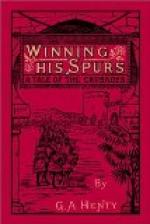“My word is sufficient,” the lady abbess replied calmly. “But should it be necessary, I should be ready to swear upon the relics that she is not here.”
A few hours later Sir Rudolph, attended by his own party and by 100 of Sir Charles Everest’s mercenaries, returned to his castle.
Three days afterwards, as Cuthbert was sitting at a rude but hearty meal in the forest, surrounded by Cnut and his followers, a hind entered breathless. Cuthbert at once recognized him as one of the servitors of his mother.
“What is it?” he exclaimed, leaping to his feet.
“Terrible news, Master Cuthbert, terrible news!” exclaimed the man. “The wicked earl came down this morning, with fifty of his men, set fire to the house, and all its buildings and stacks, and has carried off the lady, your mother, a prisoner to the castle, on a charge, as he said, of harbouring traitors.”
A cry of fury broke from Cnut and his men.
“The false traitor shall bitterly regret this outrage,” Cuthbert exclaimed.
He had in the first excitement seized his arms, and his followers snatched up their bows, as if for instant warfare. A few moments’ reflection, however, showed to Cuthbert the impossibility of his attacking a fortress like Evesham, garrisoned by a strong body of well-armed men, with only the archers of the forest, without implements necessary for such an assault.
“Send at once, Cnut,” he said, “and call in all the band. We cannot take the castle; but we will carry fire and sword round its walls. We will cut off all communication from within or from without. If attacked by large forces, we will retire upon the wood, returning to our posts without the walls as soon as the force is withdrawn. These heavily armed men can move but slowly; while we can run at full speed. There cannot be more than some twenty horsemen in the castle; and methinks with our arrows and pikes we can drive these back if they attempt to fall upon us.”
Cnut at once sent off swift-footed messengers to carry out Cuthbert’s orders, and on the following day the whole of the band were again assembled in the woods. Just as Cuthbert was setting them in motion, a distant blast of a horn was heard.
“It is,” Cuthbert exclaimed, “the note calling for a parley. Do you, Cnut, go forward, and see what is demanded. It is probably a messenger from Sir Rudolph.”
After half-an-hour’s absence, Cnut returned, bringing with him a pursuivant or herald. The latter advanced at once towards Cuthbert, who, now in his full knightly armour, was evidently the leader of the party.
“I bear to you, Sir Cuthbert, falsely calling yourself Earl of Evesham, a message from Sir Rudolph. He bids me tell you that the traitress, Dame Editha, your mother, is in his hands, and that she has been found guilty of aiding and abetting you in your war against Prince John, the Regent of this kingdom. For that offence she has been condemned to die.”




